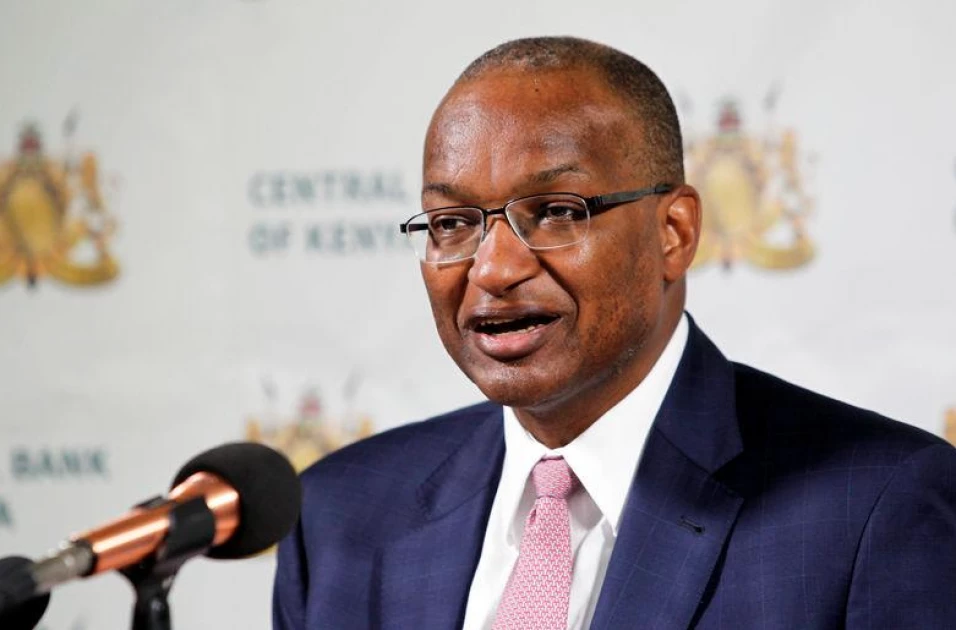Hits and misses of outgoing CBK Governor Patrick Njoroge

Kenya Central Bank Governor Patrick Njoroge speaks during a news conference at the Central Bank in Nairobi, Kenya November 28, 2018. REUTERS/Njeri Mwangi

Audio By Vocalize
Njoroge, also popular among financial journalists in Kenya as the Monk, has had a mixed bag of both hits and misses.
After 8 years at the helm of the apex bank, Dr Njoroge bids farewell to the Central Bank paving the way for Dr Kamau Thugge to take over.
Njoroge was appointed by President Uhuru Kenyatta on June 2, 2015, and assumed office effective 19 June 2015 after vetting by the National Assembly.
Less than 5 months in office in October of 2015, Njoroge’s tenure experienced the first shock. Mid-tier lender Imperial Bank of Kenya was placed under administration locking billions of depositors’ funds. This was closely followed by Dubai Bank misfortunes and a run-on Chase Bank.
“He came in at a time where the whole sector when there was turbulence. Three institutions went under in quick succession but from where we sit as banks we think that he did a good job in handling it. It was a very tough environment at the time, both for him and the sector,” KBA CEO, Habil Olaka said.
A year later, Njoroge would be tested again after the National Assembly passed the interest rate capping law. This set the cost of loans at no more than four per cent of the benchmark lending rate. Though a popular move among bank customers, the credit squeeze it caused in its tenure saw government rescind the decision.
“This law was introduced to cap interest rates was introduced to ensure that SMEs have access to credit in the country. Unfortunately, the law had the opposite effect on the economy and therefore the removal of the law will ensure that there is circulation of money in the economy,” Retired President Uhuru Kenyatta stated at the time.
According to analysts, SMEs were reportedly denied loans worth about Ksh.300 billion, about 1% of GDP, during the period. Furthermore, credit extension to SMEs as a percentage of total bank loans fell to 15% in 2019, from about 25% before the cap was instituted.
On June 1, 2019, the CBK under Njoroge’s leadership was in the news again. This time, it announced a demonetisation of the existing series of 1,000 Kenya Shillings notes, which was undertaken over a period ending September 30, 2019. The objective of the demonetisation was to address concerns about illicit financial flows and the emergence of counterfeit banknotes that CBK said had threatened the integrity of the currency.
On June, 3rd 2019, I asked the Governor: "What are you doing to ensure that you are surveilling transactions at banks and forex bureaus to reduce influx and nab individuals who are trying to bring in an illicit fund?”
“We have officers at banks and their job is to ensure that they nab or intercept people who bring in funds that they cannot explain the source,” Njoroge responded.
The success of this exercise still remains a matter of discussion within the financial services sector.
More proactively, Njoroge has also been lauded for taking bold steps that created hygiene in Kenya’s financial sector. These include the banking sector charter, a commitment from institutions under his watch to entrench responsible and disciplined banking
”It has been an absolute pleasure working with Governor Njoroge over the last 8 years especially his passion for financial inclusion. And the banking charter to be specific has had tormentors impact on the sector since its launch,” FSD Kenya CEO Tamara Cook said.
”This guided the sector and it ensured that the sector was customer-centric. This improved ethics of the banks and it will make sure we don’t see what happened to Chase, Dubai and Imperial happening to other banks,” KBA CEO Habil Olaka added.
In 2022, Njoroge once again, shone the light on the sector, coming hammer and tongs on digital lenders. The sector had flourished on predatory lending leaving many Kenyans and families distraught in their wake. For Njoroge, this was enough tribulation and he came cracking…
“We came out of an industry that had grown but had no regulation. The interactions so far have been positive and we see the sector growing under †he regulations by the CBK because it will ensure that all sector players have a level playing field and most importantly the customers are well taken care of,” Tala CEO Annstella Mumbi noted.
But amidst the hail and praise, many observers indicate that the handling of the home currency by the banker of bankers has not been without slips. At his exit, the Kenyan shilling has been on a near free fall. Njoroge however says this has been beyond his control….
“We are operating in an environment where we are unsure what other markets are going to do. Looking at the US fed for example we are not sure if they are going to increase the interest rates to strengthen the dollar,” Njoroge says.
Exit Dr Njoroge, enter Dr Kamau and the industry will be watching how the former Treasury PS will navigate the waters and if he will fit the shoes of his supervisee turned predecessor


Leave a Comment